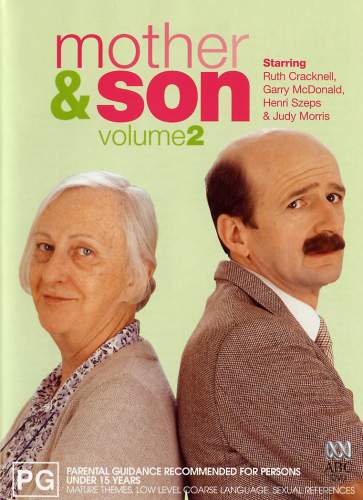Mother and Son-Volume 2 (1983) |
|
Mother and Son-Volume 2 (1983) |
|


|
| BUY IT |
| General | Extras | ||
| Category | Comedy | Menu Audio | |
| Rating |

|
||
| Year Of Production | 1983 | ||
| Running Time | 244:44 (Case: 243) | ||
| RSDL / Flipper |
Dual Layered Dual Disc Set |
Cast & Crew | |
| Start Up | Ads Then Menu | ||
| Region Coding | 1,2,3,4,5,6 | Directed By | Geoff Portmann |
|
Studio
Distributor |
 Roadshow Home Entertainment |
Starring |
Ruth Cracknell Garry McDonald Henri Szeps Suzanne Roylance Judy Morris Kristen Vergia Janine O'Brien |
| Case | Amaray-Transparent-S/C-Dual | ||
| RPI | $39.95 | Music | None Given |
| Video | Audio | ||
| Pan & Scan/Full Frame | Full Frame | English Dolby Digital 2.0 (224Kb/s) | |
| Widescreen Aspect Ratio | 1.29:1 | ||
| 16x9 Enhancement | No | ||
| Video Format | 576i (PAL) | ||
| Original Aspect Ratio | 1.29:1 | Miscellaneous | |
| Jacket Pictures | No | ||
| Subtitles | None | Smoking | No |
| Annoying Product Placement | No | ||
| Action In or After Credits | Yes, One episode only | ||
It's curious to see how television comedy fashions move on. The sitcom is a form that has been around for many years, but The Honeymooners and Hancock's Half Hour bear precious little connection to Curb Your Enthusiasm or Arrested Development. That said, it's becoming clear that the genre has moved on since Mother and Son's production over six seasons between 1983 and 1993.
Arthur (Garry McDonald) is an exasperated yet devoted son in his mid-30s to mid-40s (allowing for the multiple seasons), trying to care for his mother, Maggie (Ruth Cracknell in the defining comedy role of her long dramatic career). Maggie may be suffering advanced dementia but her determined and self-righteous manipulation of her sons in the cause of attracting their attention and filial affection allows the audience to feel somewhat more comfortable laughing at the antics of a doddering old lady. Arthur's brother, Robert (Henri Szeps), has inherited his mother's scheming ways, but brought them to a higher level as he tries - with only minimal success - to use his brother and mother to provide financial advantage and emotional validation for the minimum amount of actual effort, while preventing his wife Liz (Judy Morris) from finding out about his regular affairs.
In short, this is a formulaic family sitcom. It features broadly-drawn characters reacting to obviously contrived situations as a framework to deliver gags written into the script, and hilarity ensues. But it's in the script, and in the acting of the principals, that Mother and Son made its name as one of the classics of the genre. Geoffrey Atherden's scripts still hold up to scrutiny, more than twenty years after they were first released to the viewing public. The characters - even those who are clearly acting in their own advantage - retain a level of sympathy and humanity, although the characters feel somewhat two-dimensional compared to the more complex characters seen in modern sitcoms.
The nine episodes on this disc are selected from the last five series of Mother and Son, as opposed to the first volume 'best of' release, which presented nine episodes of the first (1983) series. While purists will decry the fact that series sets of this show are not available, the reality is that even these episodes have not aged entirely gracefully and it could well be that the 24 episodes that have not seen DVD release so far are more of historical value than worth repeated viewing.
The initial menu on each disc is preceded by general advertising for ABC DVDs that, while lengthy at 1:37, can be skipped through. There is no convenient chapter stop immediately after the opening credits of each episode, which can become irritating when watching several episodes at once. This is especially so as the opening theme music is identical to that which has just been played over the previous episode's closing credits.
The Morning After (1984, 25:55)
Arthur has a girlfriend stay the night. Having already broken up Arthur's marriage, Maggie reacts particularly badly to a potential challenger for Arthur's affections and threatens to move in with Robert and Liz. Robert does everything he can to avoid this threat.
The Christmas Drinks (1985, 27:23)
In order that he can take her to a church carols by candlelight service, Maggie cancels Arthur's Christmas party without telling him. Robert and Liz drop by to collect Christmas presents and get caught up in a family fight.
The Dog (1987, 28:53)
Presenting it as a kindly gesture to allow Arthur more free time, Robert dumps an unwanted Labrador puppy on Maggie, who is clearly unable to care for it properly.
The Surprise (1987, 27:48)
Arthur, Maggie and Liz are giving Robert a surprise birthday party, but Robert plans to be held up only briefly as he has a lover waiting for him in his car outside who he needs to dispose of without Liz finding out.
The Budgie (1989, 27:19)
Maggie has fought with Robert as she won't sell her house to help him pay a tax bill, so Arthur offers to birdsit a friend's budgie in order to take Maggie's mind off the matter. Maggie can no more care for the bird than she could the puppy from The Dog, above. Meanwhile, Robert tries to encourage Arthur to come to his tribal men's retreat on a golf course at Brookvale.
The Big Sleep (1989, 27:13)
Maggie develops a sudden case of thanatophobia, and obsesses over not only her own impending funeral but the one that was previously held for her late husband.
The Clock (1989, 25:10)
Stickybeaking at a neighbour's property viewing, Maggie is caught stealing a clock that has great sentimental value to her, and Arthur and Robert must defuse the situation.
The Ride (1993, 26:19)
Robert takes Maggie for a drive in order to cover for his marital infidelity, but leaves her alone in the car for long enough for her to get bored and wander off.
The Caravan (1993, 28:44)
Robert is storing his caravan in Arthur's driveway, and Arthur uses it as a sanctuary away from their mother - until a friend of Robert's arrives to pick up the caravan.
This is a good example of an adequate digital transfer from suboptimal source material. Recorded for television and apparently not remastered, there are substantial artefacts carried over from the original production. The level of these artefacts varies from episode to episode, especially between those recorded in different seasons.
Mother and Son is presented in its original aspect ratio of 1.33:1 and is not 16x9 enhanced.
The discs can be quite grainy at times, and edges and shadows are rarely sharp. Given the source materials, it is natural that low-level noise is present, although blocks of colour that make this apparent are relatively rare. Comet trails are obvious over bright light sources such as candles or torches.
Colours are washed out throughout the discs, but especially so in the earlier episodes. This appears to be common among TV shows of this vintage. There are occasional instances, such as that at 24:08 in The Surprise, where the film is obviously overexposed relative to the episode in which the scenes are shown. The colour of the background during the credits also varies greatly between episodes, with earlier series having a much yellower background which becomes greyer as the seasons continue.
While the MPEG transfer is relatively clean, there are several artefacts that appear to have been carried through from the source material. There are a number of film artefacts throughout, both black and white (and most noticeable over the opening and closing credits), a number of instances of telecine wobble (or even an odd telecine jump at 7:55 in The Clock) and a handful of instances where a single frame (such as at 9:40 of The Big Sleep) or odd patches of a frame (25:36 of the same episode) are cast in blue, which I can only assume to be a chemical fault present somewhere between the original film recording and the master tape. Unkind as it may be, Garry McDonald's forehead is a perfect target for posterisation to be displayed, but none was visible.
There is no subtitle track on these discs.
The first disc contains six episodes, and is dual-layered, but the changeover appears to be between episodes. The second disc contains only three episodes and may be a single-layered disc.
| Sharpness | |
| Shadow Detail | |
| Colour | |
| Grain/Pixelization | |
| Film-To-Video Artefacts | |
| Film Artefacts | |
| Overall |
These discs carry only a single, stereo soundtrack, which has only very minimal differentiation between speakers. This demonstrates the mono nature of the original soundtrack, as all dialogue emanates from both speakers, making a stereo setup, in essence, a broader mono stagefront.
Dialogue is generally clear and in good sync, but the laugh track (very) occasionally drowns out the dialogue, and was conspicuously absent from several gag lines.
Music is only present over the credits and as part of the on-screen action, but is handled adequately.
Surround channels were not used.
The subwoofer was not called upon, even during scenes featuring thunder, which gave it a light, 'tinny' effect.
| Dialogue | |
| Audio Sync | |
| Clicks/Pops/Dropouts | |
| Surround Channel Use | |
| Subwoofer | |
| Overall |
That's it as far as extras go on these DVDs.
NOTE: To view non-R4 releases, your equipment needs to be multi-zone compatible and usually also NTSC compatible.
It is no surprise that there appears to be no foreign version of this disc. Although in PAL, this disc is not region-restricted and could be viewed globally.
It may be unfair to judge a twenty-something-year-old sitcom by modern standards, but although the series stands up well against shows of its era, it was starting to show its age by the time the last series was recorded in 1993. It has further aged to the point that a few of the laughs to be had are very uncomfortable ones at the expense of a befuddled old lady (although an unkind and unpleasant one) in obvious distress.
The video and audio transfers are mediocre, but are adequate and only occasionally distracting.
| Video | |
| Audio | |
| Extras | |
| Plot | |
| Overall |
| Review Equipment | |
| DVD | Pioneer DV-535, using S-Video output |
| Display | Panasonic TX-86PW300A. This display device is 16x9 capable. |
| Audio Decoder | Pioneer VSX-512. |
| Amplification | Pioneer VSX-512 |
| Speakers | Wharfedale Diamond 8.3 fronts, Wharfedale Diamond 8.2 rears, Wharfedale Diamond 8 centre, Wharfedale 12" sub |